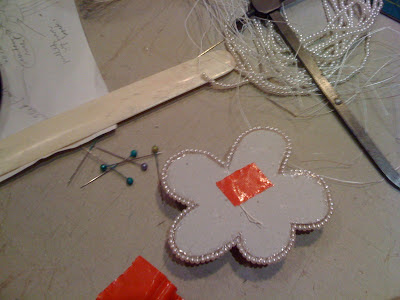There are not a few days when I wonder what exactly happened to my aesthetic in China, "
shanghaied" by a color palette too highly & discordantly keyed for my "real" taste, by a maximalism of decoration & pattern & tacky materials not at all in keeping with my pre-China work. I mean, was there any way to even imagine
ten years ago, while welding rusty steel sheet into industrial forms, that I would some day arrive at this drawer?
Sometimes, when I look at this Shanghai work from outside myself, it puzzles me: is it my
real
work or some crazy detour down a road somewhere between the Beijing
Opera Props Shop & the peddler's cart...
There's a piece of art school advice that I sometimes hear in my head. Not a piece of advice I'd think to give, but I've heard it from students who have heard it from their teachers: that the trick to making work that's authentically yours is to make art as you did when you were a a kid. And this work I make now, without much in the way of tools or equipment, certainly is that: a return to making something simply out of what's at hand.
And then there's what I think of as the DP [displaced persons] thing. A friend here, the writer
Lisa Movius, likes to point out that while we foreigners think of ourselves as "ex-pats", we're really economic migrants just as much as the
"floating population" of laborers come to the city from the Chinese countryside.
Which is an ironic turn in life for me, the child of immigrants, albeit political rather than economic refugees, people who found their way to America post WWII via DP camps. The experience of which was vivid to me as a child as it dominated the conversations of the adults around me. "Oh," they'd slap each other on the back after church & say, "I haven't seen you since Camp." By which they didn't mean Summer.
It struck me one day, at the performance of an english-language theater company, that life here is in its way kind of like DP Camp: a microcosm of the world left behind recreated in a foreign place. Theater erupts as soon as any group of exiles congeals: there was a theater company in the DP camp at Bertesgarten where my mother & her family were interned and even in some of the concentration camps. There's clearly some essential human need that's satisfied by the interpretation of life thru drama. Art doesn't even need community, just materials, as witnessed by the things that made it from DP camp to my parents' house in Queens: from packages of silk stockings, scrap bits of backing board used for paintings; parachute silk for embroidery; aluminum cans for bracelets... not unlike the detritus of Shanghai that end up in the drawers.
That's what I'm thinking when I'm outside the work.
When I'm inside the work, at my best, I'm amusing myself, indulging in the over-the-topness that the material world here inspires...wondering how to turn this latest stripey mop on its head...with an assist from a willing student in an American Culture class... and into Beijing Opera headware. Taking it from functional object to gesture to object transformed... the quotidian become theater.
Last night at the
Lit Fest, with this post nearly written, I got to see
Chris Doyle, my favorite of all cinematographers, and, with director
Wong Kar Wai, the creator of some of my favorite Chinese films,
In the Mood for Love, &
Chungking Express. Doyle,
his head shaved by Ai Weiwei, in a multi-media presentation called
Away with Words, interviewed himself thru his Chinese incarnation, Du Kefeng, about process, motivation, meaning, language/wordlessness. It was transcendent: one of those [rare-ish] moments when you feel the glory of your calling.
I was too transfixed to take notes. What stays in mind is Doyle circling in, again and again, to the need for engagement with where you find yourself, to revealing the things, masked by familiarity, that an outsider's eye can see and finally (the one quote I did write down) to manifesting "the bridge between what you see and how you respond to it."
So maybe it's not a detour, maybe I'm not as lost as I thought I was. Still, it's kind of a weird aesthetic...
If you happen to be in the northeast far-reaches of Shanghai, please come try on the Opera Mop & other hats made from household goods & pearls at "Shanghai Crowns & Fascinators." Opening Tues, March 19th, 3-5 pm. Thanks to the Center's director, Jenny Tarlin, for the opportunity!
American Culture Center
University of Shanghai for Science & Technology
516 Jungong Road, Yangpu
Shanghai 200093021 5512 3295 (China - Office)
 |
| From the top: 1 & 4. Pompoms from Beijing Opera headware, fake pearls; 2 & 3 fragments from headware (metal screen, epoxy, paint, blue fabric, wire springs & fake pearls) in the pattern of "happy clouds" See post # 16 for related images. Photo credit for drawer: Bruno David |













